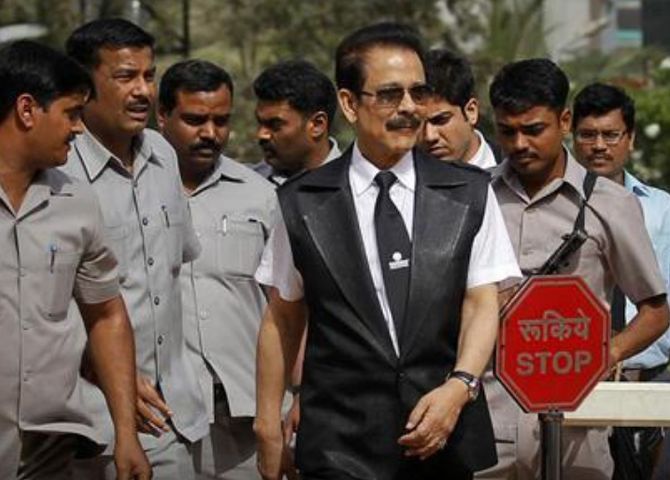'A few years back two big politicians -- both good friends of mine -- came to me and offered (to keep with) me big money. They said they had full faith in me and they wanted to keep Rs 10,000 crore-Rs 15,000 crore with us.'
On the passing of Subrata Roy, we excerpt his most detailed interview, from Sahara: The Untold Story by Tamal Bandyopadhyay, with the author's kind permission.

In Subrata Roy's walled city [Sahara Shahar in Lucknow], there are no restricted zones. "He is our guardian; anyone can walk into his house," the driver told me. We drove into the compound of his residence. The guards watched, but did not stop our car.
Post lunch, we met at his secretariat for an interview. I had chased him for months for this meeting. We had met the previous day in the same room that boasts a big black-and-white photograph of Roy holding the hand of Mother Teresa. "When she held my hand there was something going inside my body; something really difficult to express," Roy says
Settling for the interview, we had tea and spoke while he munched on homemade kucho nimki, a tea-time snack in Bengali households, salty and crunchy.
Roy's key argument in his fight with Sebi is that Sahara, being unlisted, does not come under the purview of the market regulator. Two former chief justices and two additional solicitor generals have given affidavits in favour of Sahara's argument, and former law minister M Veerappa Moily, too, said that the Sahara group was right, Roy stated.
In April 2010, Sebi had forwarded some OFCD investors' complaints to the registrar of companies in UP and Maharashtra, saying these Sahara companies were unlisted and had not filed prospectus for raising funds with it. It requested the two registrar of companies "for examination (of the complaints) and necessary action," Roy said.
He remains unfazed by Sebi's determination to target the group, because, he said, he was sitting on a massive 36,631-acre land bank, possibly the biggest held by any corporate entity in India. However, Roy doesn't want to sell this land. "We are an unlisted company. We don't need to take care of EPS (earnings per share). Why should we sell?" he asked.
Our conversation meandered through a range of issues. Here are some edited excerpts from the interview conducted in January 2013:
What happened in 2005? You seemed to be terribly unwell. Nobody knew what happened to you.
There was no health problem. It was created by the media. I had developed (high) blood pressure, which used to shoot (up) and come down in 15 minutes. The fluctuation continued between 200 and 100/110.
The doctors said only a change in lifestyle would help me; overwork for 28 years and little sleep have created the problem. They advised me to follow a routine at least for three months -- I was advised to get up in morning, go for a walk, do yoga, stop travelling, etc.
I wanted to consolidate all group activities. That gave me an opportunity to stay back at home and plan. I was not even aware of the problem till one day, my wife showed me two magazines carrying nasty things about me and my health. I spoke to all (TV) channel owners. I gave one statement.
Why was former RBI governor (Y V) Reddy after you?
It was a problem in Delhi -- I am 100% sure; beyond that, I cannot say anything.
The RBI first told us that the disputed IT amount could be part of the directed investment -- they asked us to give them at least two examples of refund -- but later withdrew the directive. We had to bring in Rs 1,400 crore -- that too in the form of capital, not debt. We could put up only Rs 600 crore.
The RBI first issued a show cause notice, and on the third day, they clamped down a prohibitory order. We had to go to the (Allahabad) high court; they ran to the Supreme Court. They had to change that order -- such a thing never happened in the RBI's history.
They took it with vengeance. We were investing Rs 500 crore in the State Bank, but the bank refused (at the instance of the RBI). The RBI threw our directors out.
(H N) Sinor (who was on the SIFCL board) once said if anybody should get a bank licence, Sahara should get it. He was positive. Nobody was willing to hear positive things.
Out of 100% (deposits), if 80% investment are done as per the RBI directive, and there is an RBI inspection, (then) where is the problem? They gave us time till 2015 (to close business); we completed by 2012 -- only Rs700 crore to Rs 800 crore is (now) left to be paid. We are tracing some depositors... It will take a while.
Does Sahara make money by forfeiting people's deposits?
I can only say one thing and you can record it ten times -- I have never done one wrong thing in my life. That's how I can fight. People can make all sorts of stories. I call them chandukhana ki kahani (tales from the opium house). We read (things) about ourselves which we don't know.
Does Sahara keep politicians' money?
Never. In fact, a few years back two big politicians -- both good friends of mine -- came to me and offered (to keep with) me big money. They said they had full faith in me and they wanted to keep Rs 10,000 crore-Rs 15,000 crore with us.
I told them, I am thankful to you that you have so much trust in me, but I will never keep your money. In 1978-1979, when there was question of existence for us, my chartered accountant in Gorakhpur told me if we could just make an entry of Rs 10 lakh-Rs 15 lakh, we can earn a few thousand rupees, but I said no to it.
I told these politicians, if I didn't do it then, why should I do it now?
I challenge you to prove (that we keep politicians' money).
We hear that former UP chief minister Vir Bahadur Singh left a pot of money with you and from there you had started...
I met him twice in my life. Once we took some action against our own people and he called me to tell me I should not have done that. We met for the first time for ten minutes. The second meeting was at a family function of the inspector general of police -- I was his tenant. I was introduced to him and I said namaste.
Will you join politics?
No. Everybody offered me Rajya Sabha (seat), but I said no. I will never join politics.
Who is your closest friend? Amar Singh or Mulayam Singh Yadav?
How can I tell you? I am close to everybody. If you are my friend, you're my friend -- I cannot be a nopungsak (coward) and disown you -- I am not a fair-weather friend.
Is Sahara a vehicle for turning black money white?
In 34 years, we have not given any unsecured loan to anybody. Not even to our directors. If you keep Rs 100 worth of securities, we give you Rs 70.
The Supreme Court said you cooked up names like Kalawati and Haridwar as depositors.
It's a baseless allegation. A newspaper sent its reporters to track them down and they recorded their statement.
I hate to bribe people. They say all this because they have to justify themselves. I will not do it even if somebody wants to kill me. I don't get involved in these things.
There have been allegations that money raised by your group from investors through OFCDs has been partly used to buy the London hotel. This is round-tripping.
If they find anything wrong, they can hang Sahara. We haven't done anything against the law.
When we bought a guesthouse in Chelsea, somebody suggested some ways to buy the property, but I said we would buy openly -- can’t we spend $25 million for a guesthouse? We are very strict on law matters.
We vehemently oppose the allegation that the money for the acquisition of Grosvenor House Hotel was remitted from SIRECL (Sahara India Real Estate Corp). The funds were remitted from Aamby Valley (Ltd) to its subsidiary Aamby Valley (Mauritius) (Ltd) which invested in the hotel.
SIRECL is a real estate company. As per the objects of the company mentioned in its OFCD prospectus, it made a joint venture investment in some real estate projects with SICCL (Sahara India Commercial Corp.), another group company.
Sebi had not banned SIRECL in any manner whatsoever at the time it made a joint venture investment in SICCL on 20 November 2010.
Thus, at any stage, there has not been a single incident of violation of any regulatory or legal requirement. The flow of funds is very much in accordance with the objects of the respective companies and we have been very open right from the beginning about the entire transaction.
Tell us about your failed aviation venture.
The reason for getting into aviation was that it would serve the nation. India needed a top-notch airline and Air India was incapable of delivering. Then came the price war as the competition intensified and more players were allowed in.
At that time, I told the concerned ministers, 'Look, you should ask us -- the existing players -- to go for a low price model.' I would also like to mention that there is nothing called a low cost model. It's a low price model. The cost is the same. We only save on in-flight food and beverages.
I even said, don't open the skies; there will be a problem. The minister said, no. So, I said, fine, we will not be in the picture.
We got our money out of it. I am very happy we got out at the right time.
Except for finance, Sahara has not done well in any other areas.
It's a very wrong impression. Today the asset value of the group is Rs 152,000 crore. I knew that one would never regret owning land if one purchases a right piece. I have done that continuously.
We have 36,000 acres of land. We are not listed; we don't need to maintain EPS. I prefer to save tax and give the money to my workers; spend on social work. Tax savings is not a crime. Had we been listed, you would have seen the money. Recently, we have adopted 1,100 villages, spending Rs 550 crore.
You claimed to have repaid Rs 170,636 crore to 147 million people. How?
We started with prize chit schemes in 1978, but that was banned in 1980.
Then we went for unincorporated body -- Sahara India. When it was disallowed, we shifted to a housing finance company. It did not have any ceiling.
When ceiling was imposed (on raising deposits), we went for mutual benefit company. When that too was banned, we went for the RNBC. We were doing very well -- we were very happy. Right from the first year, we were making profits.
But the RNBC was banned. Then we had to go for the OFCDs.
Now we are into cooperatives. Our 10 million people (agents and employees) were depending on daily accounts. They wanted to start cooperatives. I told them to go ahead. They are the promoters; we are not.
Not a single brilliant young entrepreneur who is not from a very rich family can ever hope to develop a big business in India.
- Part 2 of the Subrata Roy Interview: 'I don't think I will die so fast'










